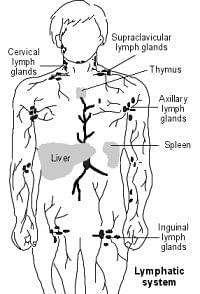Facts about Non-Hodgkin’s lymphoma

Non-Hodgkin's Lymphoma (NHL) refers to a group of cancers arising from lymphatic system of the body which help us fight infection and diseases.
The cancer originates in the lymphocytes (a type of white blood cell) and gradually spreads throughout the other components of this system like lymph node, spleen, tonsils and other lymphoid tissues in the gut, respiratory tract and bone marrow.
Lymphocytes are mainly located at lymph node and hence it is called most vital part of this system. They are mostly grouped in armpit, neck, groin, near elbow and in abdomen which are only felt manually when they are enlarged up to a sizeable dimension due to infection or cancer. Lymphocytes are also found in many organs indicating that lymphoma may originate also from organs not otherwise known as lymphoid organs.
Cause
The exact cause of transformation of lymphoid cells into cancer is not known, but several associated conditions are considered as causative factors in lymphoma.
Infections with viruses like Epstein Bar Virus, HIV and bacteria e.g. gastric lymphoma caused by a bacterium called Helicobacter pylori.
Infection by these organisms may give rise to genetic abnormalities. Immune deficiency state either congenital or acquired is associated with higher incidence of NHL.
Diagnosis
Diagnosis of NHL is simple when patient presents with enlarged lymph node in accessible parts of body such as neck, armpit or groin.
Excision and biopsy is the standard procedure, FNAC (Fine needle aspiration cytology) as a means of initial diagnosis is not recommended which may be misleading.
If the patient has lymph node enlargement only inside the abdomen then diagnosis may require operative procedure known as laparotomy (opening up of abdomen) to get tissue for histopathological examination.
However, in such cases ultrasonography or CT scan guided FNAC may provide some clue to the diagnosis even if it cannot confirm.
When only extra-nodal organs are involved, biopsy or FNAC may be necessary to confirm the diagnosis of NHL. About 10-20 percent of patients present without evident lymph node enlargement posing a very difficult diagnostic problem. In such patients imaging studies may aid to discover some intra-abdominal lymph node enlargement or lesions in extra-nodal organs providing clues for diagnostic exploration.
To determine the extent of the disease, staging of cancer apart from physical examination of patient is needed. Staging dictates the modality of treatment and indicates the prognosis of disease.
Treatment
Treatment of NHL depends on the histopathological type and extent of disease.
High grade NHL is highly sensitive to both chemotherapy and radiotherapy and prognosis is good. Some factors like age, co-morbid illnesses, general condition (also known as performance status), organ dysfunctions not related to lymphoma are important for taking into consider before embarking into the toxic chemotherapy.
Radiotherapy used to play important role in the management of NHL. Even now it plays major role in the treatment of localised low grade NHL (stages 1 and 2).
The gold standard for treatment of high grade NHL is chemotherapy with combination of drugs. An effective and latest option called immunotherapy is recommended now and yields better results.
Many patients who are either unfit or unlikely to tolerate chemotherapy because of multiple organ dysfunctions, immuno-therapy is the treatment of choice for them.
With the given information that early stage of disease goes into remission mostly and in many cases can be cured. Our target should be to detect the disease at earlier stage, confirm the diagnosis and commence appropriate therapy as early as possible.
Efforts should be made to alleviate undue fear and apprehension about chemotherapy and its side effects such as loss of hair, vomiting etc. which are all temporary and mostly controllable with newer medicine.
This can be done by open discussion and providing detail information about the disease and its treatment modalities. Awareness about cancer, its early warning signs and the fact that most of the recent therapies are available in our county, will reassure the cancer patients.
Dr. Lt. Col. Md. Mofazzel Hossain (Retd) is an Associate Professor of Oncology, Bangladesh Medical College.

 For all latest news, follow The Daily Star's Google News channel.
For all latest news, follow The Daily Star's Google News channel. 



Comments